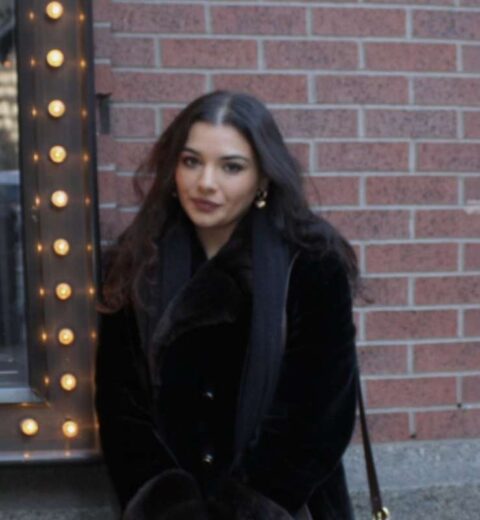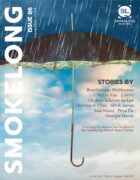I love the beginning of your powerful story! How did you decide where to start this piece?
Thank you so much! The first lines of the piece came to me before the whole premise did. I wanted to write a story about two girls entangled in something that they felt only they could truly understand. When I write towards anything really intense, I’ve noticed I usually play with a jaded or passive voice. The first line I started with was: “We didn’t like to talk about love unless there was pain involved, otherwise we found it so uninteresting.” I found it interesting to think that these two girls, still so intertwined, feel the need to characterize their own tenderness with coolness, or feel unable to recognize love as anything other than something demeaning; even with their bond with each other, and even in their being “loved” by society as public figures. Then, in making the decision of writing them as models, the rest of the opening unraveled.
We’re in the 90s here, but I’m still intrigued by your choice of past tense, which helps keep the focus on the girls’ traumatic bond. Was it a conscious decision to tell the story in past tense, or did it appear organically?
I usually write in present tense so at first writing in the past felt sort of unnatural, but for me I think it allowed me to better understand the length of time these girls spent working together and their inability to remove themselves from it in the wake of them “leaving” or resisting the industry. I think past tense feels more permanent and it helped me offer a sense of consequence/unchangeability. But also, plainly, this story came out of direct research on the 90s modeling industry, so it felt more natural to write in past tense. Last year, after going down a Wikipedia rabbit hole, I drafted a play about supermodels for my thesis as an undergrad and all I’ve learned about them really sticks with me. With the past tense, I also really wanted to better make apparent the fact that now, in 2024, we read stories about abuse in entertainment industries in a different context than many would have in the 90s.
I love how you chose compassion and a shared understanding for the girls through the evil of this industry. However, what’s unspoken between them causes constant physical and emotional pain. Do you think love without pain will exist for them in the future? Do you think love without pain exists at all?
Thank you! I always like to think that goodness/love/etc., exists in anyone’s future. I find that it’s unhelpful for me to write stories or characters that I don’t feel hopeful for. I find the idea of healing almost always more interesting than suffering, whether or not that’s explicit in a narrative and whether or not a movement towards healing has any direct physical presence in a story. Especially in times like these and with subjects such as this one, I think it’s important to trust that goodness is possible, even if it’s not completely what the story is about. As for love without pain, I don’t think anything worthwhile exists without the possibility of at least a little bit!
I’m in love with the narrator’s voice and your poetic word choices. How did you decide which girl should narrate this story?
Thank you! In my mind, the two central girls are almost even in their prominence, despite one of them being the narrator. I liked the idea of giving narrative voice to the model who was fully “silenced.” Still, I believe they both had almost equal presence in the story. I also feel as if the two girls, in their being consumed by the industry and in their shared trauma within it, almost see each other as mutually fated. When one is sent away and silenced, the other, even being a “free woman,” also feels that she is too, which is sometimes how I imagine immorality in that industry, and maybe other industries too, survived.
On your website, I read that you’re interested in “performance, beauty, violence, and unconventional attachments.” What drives you to these topics?
I’ve always been interested in glamour and beauty and media and the darker side of it all. In my writing I sometimes think of performance, beauty, and violence, as inherent in each other. I like questions about what beauty conceals, what violence looks like to those who perform unaffected by it, no matter what they may actually be enduring, and what a breaking point in relation to all of that may look like. I also just love writing about love and attachment in varying forms, even when strained or strange or complicated. Even when I don’t mean to write about that, what people save each other from, it sometimes becomes what my story is really about, anyway.


